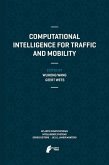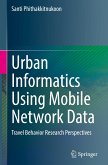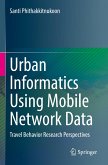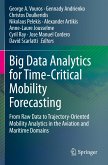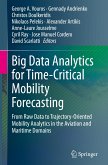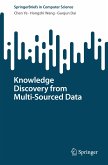This book introduces the concepts of mobility data and data-driven urban traffic monitoring. A typical framework of mobility data-based urban traffic monitoring is also presented, and it describes the processes of mobility data collection, data processing, traffic modelling, and some practical issues of applying the models for urban traffic monitoring.
This book presents three novel mobility data-driven urban traffic monitoring approaches. First, to attack the challenge of mobility data sparsity, the authors propose a compressive sensing-based urban traffic monitoring approach. This solution mines the traffic correlation at the road network scale and exploits the compressive sensing theory to recover traffic conditions of the whole road network from sparse traffic samplings. Second, the authors have compared the traffic estimation performances between linear and nonlinear traffic correlation models and proposed a dynamical non-linear traffic correlation modelling-basedurban traffic monitoring approach. To address the challenge of involved huge computation overheads, the approach adapts the traffic modelling and estimations tasks to Apache Spark, a popular parallel computing framework. Third, in addition to mobility data collected by the public transit systems, the authors present a crowdsensing-based urban traffic monitoring approach. The proposal exploits the lightweight mobility data collected from participatory bus riders to recover traffic statuses through careful data processing and analysis. Last but not the least, the book points out some future research directions, which can further improve the accuracy and efficiency of mobility data-driven urban traffic monitoring at large scale.
This book targets researchers, computer scientists, and engineers, who are interested in the research areas of intelligent transportation systems (ITS), urban computing, big data analytic, and Internet of Things (IoT). Advanced level students studying these topics benefit from this book as well.
This book presents three novel mobility data-driven urban traffic monitoring approaches. First, to attack the challenge of mobility data sparsity, the authors propose a compressive sensing-based urban traffic monitoring approach. This solution mines the traffic correlation at the road network scale and exploits the compressive sensing theory to recover traffic conditions of the whole road network from sparse traffic samplings. Second, the authors have compared the traffic estimation performances between linear and nonlinear traffic correlation models and proposed a dynamical non-linear traffic correlation modelling-basedurban traffic monitoring approach. To address the challenge of involved huge computation overheads, the approach adapts the traffic modelling and estimations tasks to Apache Spark, a popular parallel computing framework. Third, in addition to mobility data collected by the public transit systems, the authors present a crowdsensing-based urban traffic monitoring approach. The proposal exploits the lightweight mobility data collected from participatory bus riders to recover traffic statuses through careful data processing and analysis. Last but not the least, the book points out some future research directions, which can further improve the accuracy and efficiency of mobility data-driven urban traffic monitoring at large scale.
This book targets researchers, computer scientists, and engineers, who are interested in the research areas of intelligent transportation systems (ITS), urban computing, big data analytic, and Internet of Things (IoT). Advanced level students studying these topics benefit from this book as well.


